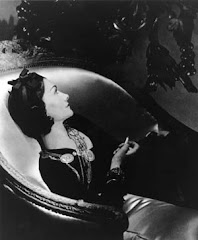How do you cure writer’s block?
I walk down Bond Street and look at the clothes.
Can you remember the first novel you read?
Hugely precociously it was Crime and Punishment, when I was 13.
What makes you cross to read?
Novels about nothing.

How do you cure writer’s block?
I walk down Bond Street and look at the clothes.
Can you remember the first novel you read?
Hugely precociously it was Crime and Punishment, when I was 13.
What makes you cross to read?
Novels about nothing.
Posted by
Linda Grant
at
16:49
1 comments
![]()
![]()
![]()
![]()
Labels: about the site, Literature, The Clothes On Their Backs

One of my favourite films is the strange bitter-sweet 1948 Letter from an Unknown Woman. The author of the novella on which it is based was Stefan Zweig, and Patrick Wright has a long piece about him in the Guardian today. Antony Beevor once told me that Zweig's Beware of Pity was his favourite novel, and how odd that a Viennese Jew should have written the great novel of the life of a cavalry officer.
Zweig describes the late 19th century of his childhood as the "world of security". Its values were established and largely beyond question. Its members were confident in their monarchy and parliament. As for the possibility of violent disruption, scarcity, war and the intervention of life-changing fate, all such thoughts were swept under the carpets of a society devoted to bourgeois comfort.What did they see, asks Zweig of that world in which everything had its norm, its definite measure and weight? Each of them lived his life in uniformity. A single life from beginning to end, without ascent, without decline, without disturbance or danger, a life of slight anxieties, hardly noticeable transitions. In even rhythm, leisurely and quietly, the wave of time bore them from the cradle to the grave . . . What took place out in the world occurred only in the newspapers and never knocked at their door.
Should he decide to travel, the well-off European of this age might journey as far as India without a passport: the frontiers which, with their customs officers, police and militia, have become wire barriers thanks to the pathological suspicion of everybody against everybody else, were nothing but symbolic lines which one crossed with as little thought as one crosses the Meridian of Greenwich.
Formed in this atmosphere, but also torn out of it, Zweig was both the creature of his time and the roughly awakened judge of its illusions. He condemns the desiccated rigidity of its school curriculum, its confining customs of women's dress and its sexual hypocrisy. The people of this era were naively settled in their optimism and "touching liberalism". They had no idea that life could also consist of "tension, and profusion, and being lifted up from all sides", or that "each succeeding day that dawns outside our window can smash our life". They refused to heed the warnings of Sigmund Freud, who had argued that their optimistic idea of reason as the force of the future was a chimera floating over turbulent complexes and drives.
Posted by
Linda Grant
at
16:03
2
comments
![]()
![]()
![]()
![]()
Labels: Literature
Jess Cartner-Morley in the Guardian today has given the name to the look I have been unconsciously wearing since the summer.
The "feminine" versus "hard-edged" aesthetics have swapped places so many times that no one can quite remember which is more fashion-forward at any particular moment in time. The more strategic element of the fashion show-attending sorority have adopted a new uniform, one in which they can fight on both fronts. We on the Guardian fashion desk have pithily dubbed this look "floaty with a bit of a jacket".Catchy, huh? As an acronym - FWABOAJ - it veritably trips off the tongue, does it not? But what it lacks in verbal snappiness it makes up for in functionality. It means that whichever way the fashion weather vane swings next, at least half of you will be pointing the right way.
The best thing about FWABOAJ is that it can be cobbled together from pieces you have in your wardrobe already. (I love calling clothes "pieces". It lends my mountain of half-decade-old Mango sale purchases such an air of rarity and refinement, don't you think?
Posted by
Linda Grant
at
08:16
1 comments
![]()
![]()
![]()
![]()
Labels: Elements of style
Posted by
Linda Grant
at
07:58
0
comments
![]()
![]()
![]()
![]()
Labels: Thought for the day